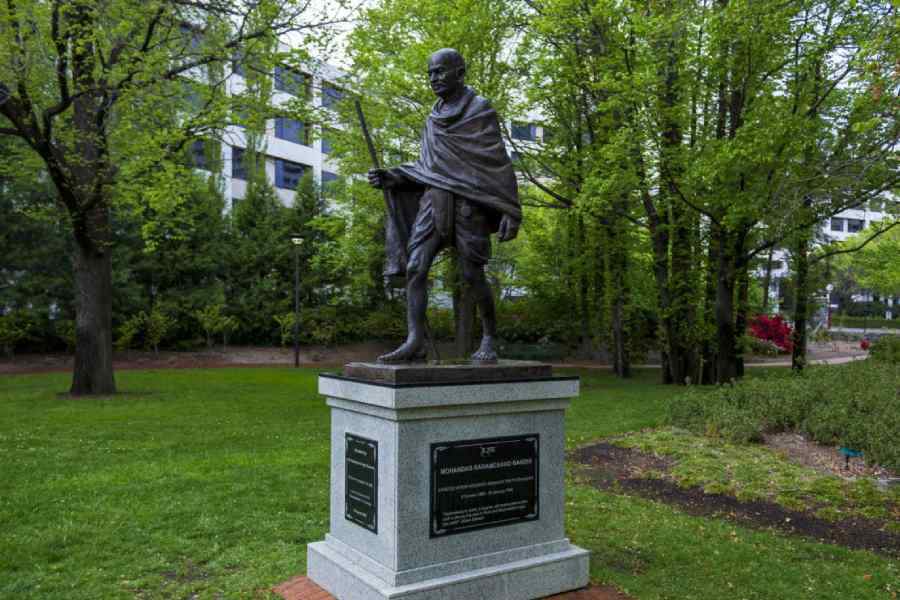GANDHI’S AUSTRALIA, AUSTRALIA’S GANDHI
By Thomas Weber
Orient BlackSwan, Rs 1,900
Like any great man, M.K. Gandhi did not have equal reception to his ideas across the world. Whereas countries like the United States of America and Britain have had long-standing engagements, as friend or foe, with Gandhi’s philosophy and praxis, Australia and Canada did not partake of the Gandhian influence in the same measure. Even Gandhi himself was quite dismissive of Australia as a country embodying institutionalised racism through its White policy. Equally, very few Australian visitors, public intellectuals, eminent citizenry, the academia, and the public at large evinced any sustained interest in Gandhi’s life and his work. Whatever little media depictions pertained to Gandhi and the Indian national movement were mediated by the imperial British press. Against this backdrop of general disinterestedness, “what Gandhi thought about Australia plus what Australians thought and now think about Gandhi and his legacy is the book’s agenda.”
The first chapter presents a comparison of Gandhi’s multi-layered and chronologically deep relationships with Britain and the US (and Gandhi’s vibrant afterlives). As against this, Gandhi’s relationship with Australia was a non-starter and he never loomed large in the Australian public imagination. Thomas Weber, a Gandhi scholar, attempts to address this gap by giving a detailed account of Gandhi’s encounters with visiting Australians, howsoever few. How Australian citizens in general and the media in particular have taken to Gandhi in historical and contemporary terms constitute the substance of this volume. Weber is particularly keen on mapping out the Gandhian influence in Australia in the context of activism for peace.
In this meticulously researched book, Weber presents varied Australian interlocutors and observers and their interactions with Gandhi notwithstanding the scantiness of historical material. In the process, he offers a fresh glimpse into Gandhi’s personality and his philosophy. The value of the book lies in it being the first of its kind to study Gandhi’s relationship with Australia and Australians and introducing Gandhi as an apostle of peace and non-violence to new audiences who may want to know more about him as a guiding light in our troubled times. Viewed thus, it is yet another addition to Gandhiana, with painstakingly collected details.
Even though Gandhi had no discernible impact on Australian intellectual and political life, the author labours to demonstrate how Gandhian philosophy and teachings influenced Australian peace, environmental, religious and aid movements. Ironically, Weber’s zeal to establish Gandhi as an influential figure in the Australian context makes his argument contrived. One appreciates Weber’s disappointment over Australia’s neglect of Gandhi. However, this should not mean swinging the Gandhian pendulum to the other extreme wherein Gandhi pops out of everything Australian. As Weber himself argues, “it seems Australia was never quite certain whether to condemn the traitorous Gandhi or to laud the saintly Mahatma, or whether to simply ignore him.”
There was no well-known Gandhi-backer in Australia, which was neither an imperial power under threat nor did it have a history that included a war against the British for independence. Consequently, Australia did not have substantial interest in, and coverage of, Gandhi. Its small population size and the lack of international exposure were the other possible factors contributing to Australia’s relative ignorance about Gandhi.
But the seemingly little public interest in Gandhi did not preclude the celebration of his birth centenary, which paved the way for the publication of books on him as well as visits to Australia by noted Gandhians. Gandhi’s presence in Australia is quite palpable these days if one goes by the number of statues, orations, and public celebrations marking his birth and death anniversaries, especially among the Indian diaspora in Australia. Yet, Gandhi’s presence in Australia in “more subtle guises” and Australians’ awareness of “who he was and what he stood for” remain the moot point.











